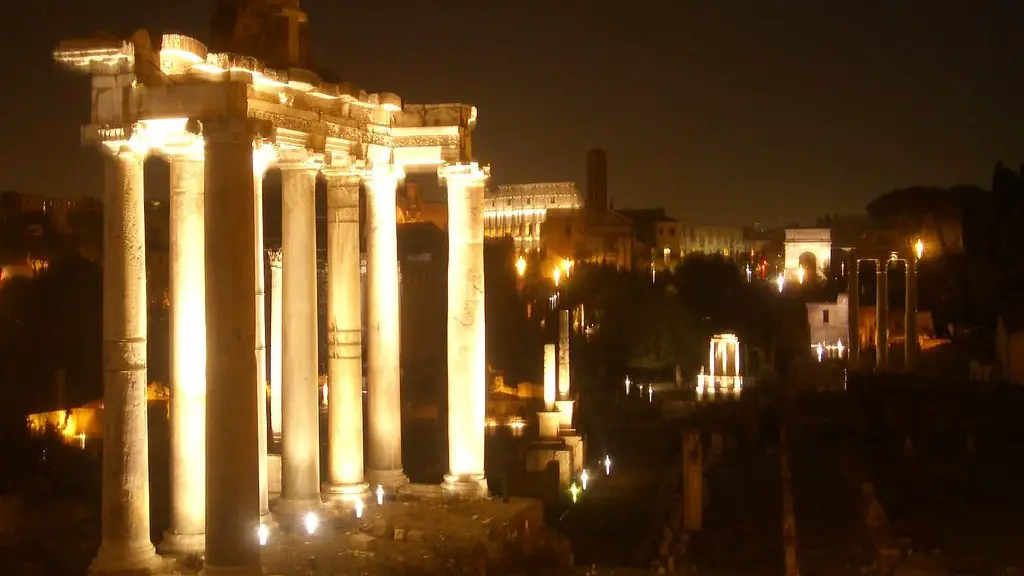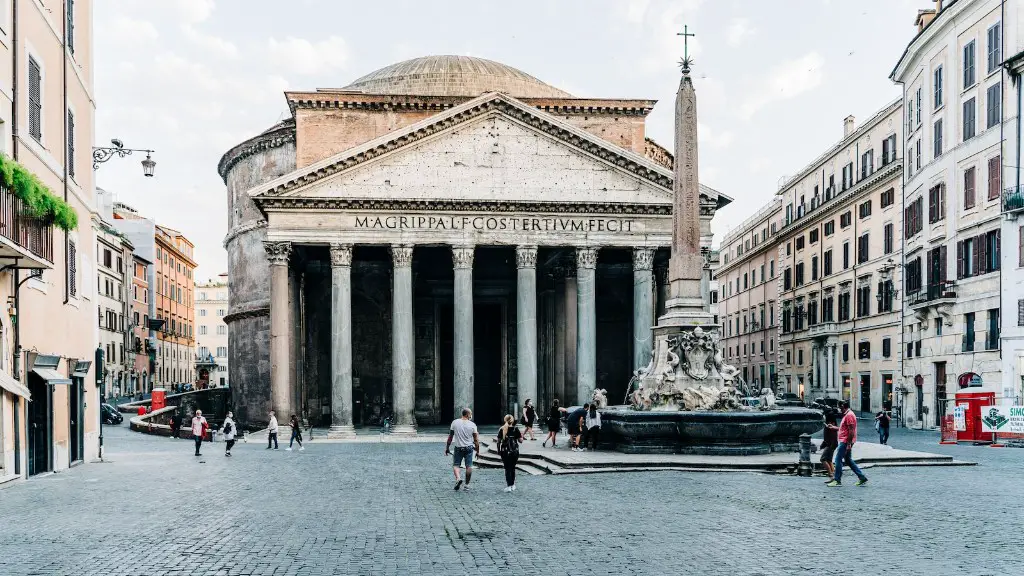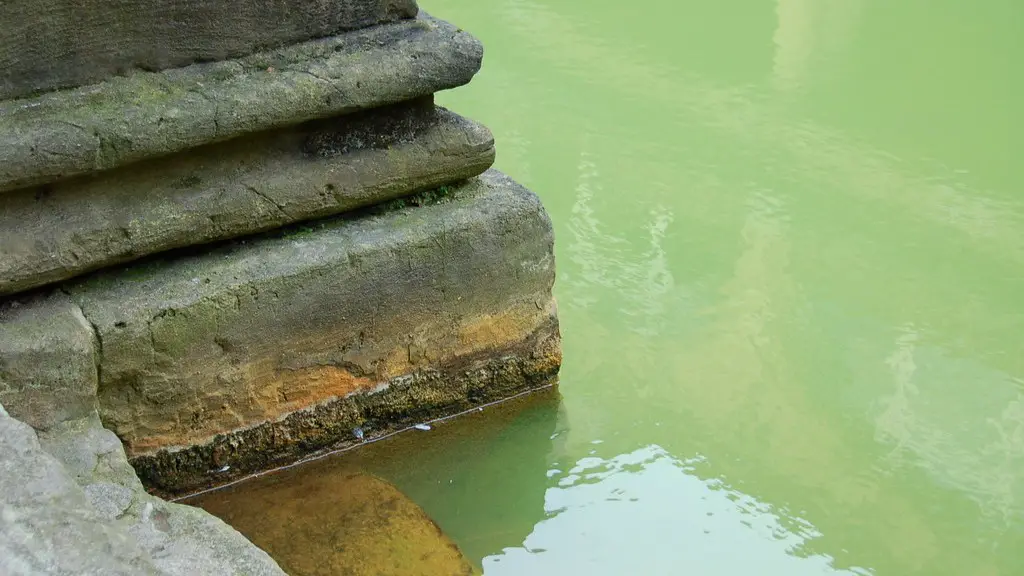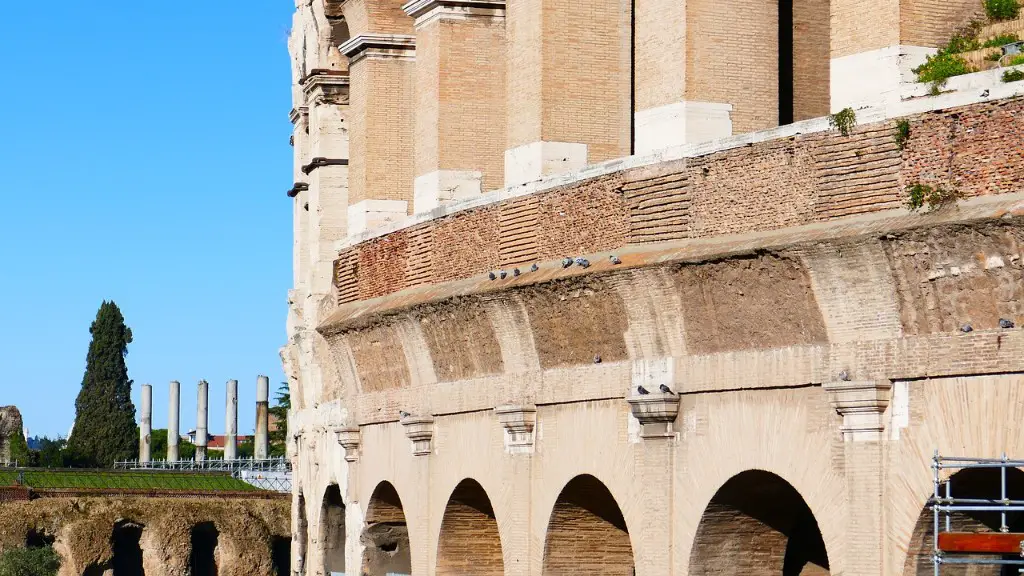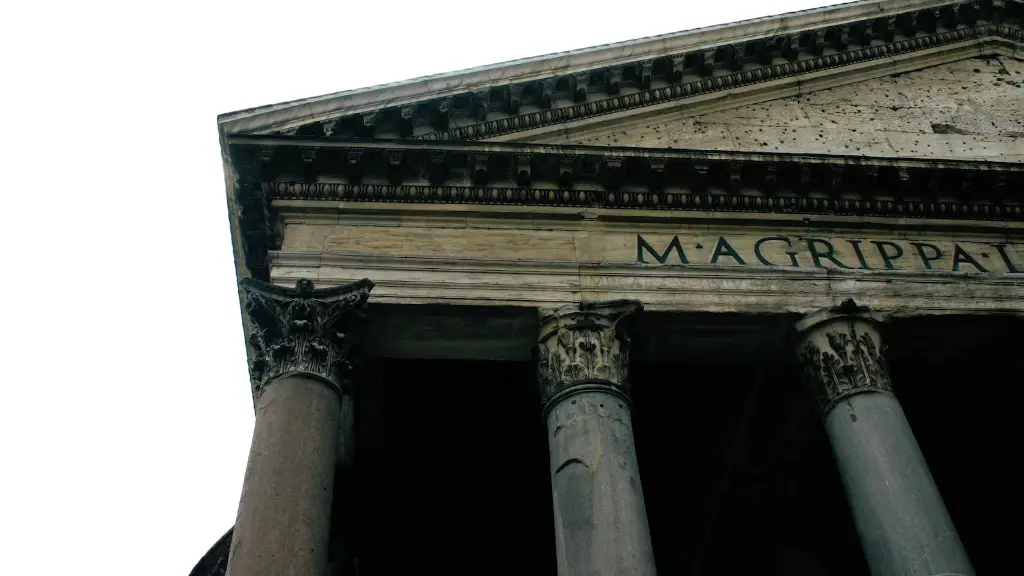Fighting the Enemy
Military life in ancient Rome was a vital and integral part of the Roman Empire. The Roman Legions, which consisted of heavy infantry, and the Auxilia, which consisted of archers and cavalry, were the main military forces in Rome. These forces were used to protect the borders of the empire, as well as to take part in Rome’s many wars and civil conflicts. In order to serve in the military, men had to be physically fit, and between the ages of 17 and 46. Roman soldiers were known for their ferocity and courage, traits that were valued by the city-state.
Life within the Roman Army was hard and demanding, but it was also an honorable vocation. Soldiers were well-organized and disciplined and followed a strict code of conduct. Soldiers had to adhere to the rules or risk harsh punishments or even death depending on the severity of the offense. Additionally, they would be expected to take part in daily drill, guard duties and other tasks that were necessary to maintain the security of the empire. They even had to keep clean and attend religious ceremonies.
The Roman army was renowned for its mobility, using a variety of siege tactics such as encirclement, advancing heavy artillery and constructing extensive fortifications. This enabled them to quickly and effectively deal with enemy forces and conquer and control large swathes of land. This included forays into Britain, Germania, and beyond.
Training was essential for soldiers in the Roman army. Soldiers were trained to improve their strength and military skills, including the use of weapons. The most common weapons in the Roman army were swords and spears, but they also used bows and javelins, as well as siege engines, catapults and battering rams. Training and fitness was taken seriously and was regulated and monitored by the officers of the Roman army. Training also included marching, drilling, and parading, as well as mastering techniques of combat in groups such as the phalanx formation.
A soldier in the Roman army was provided with food, clothing, and weapons. They were also entitled to free medical care and other benefits such as housing. This was to ensure that they could perform at their best duty roster and stay healthy. Soldiers could expect to receive regular promotions for their dedication, service and courage and also had access to leading positions within the army. However, the most valued reward for a Roman soldier was glory in battle and the respect of their peers.
Social Norms and Structures
Roman army life was governed by laws and regulations. Disobedience was severely punished and the soldiers were expected to obey their superiors without question. Roman society was very stratified and military life was no exception. Officers and commanding officers had different privileges and responsibilities than regular soldiers. Each rank of the military had its own dress code, housing, food and other privileges. Social rank was also based on one’s wealth or patrician family line. Wealthier officers would enjoy better housing, food and wages.
Relationships between soldiers were based on loyalty, cooperation, and tolerance. Soldiers had to be loyal to their superiors and were expected to take care of the health and personal needs of their comrades. Mutual respect and trust between comrades was essential for the smooth running of the army. Rome had many slaves who would work for their masters on the battlefields and provide a variety of services for soldiers, such as cooking and cleaning. Slaves also served as bodyguards and could also be used in battle.
Everyday Life
Daily life in the Roman army revolved around strict activities such as drill, practice and parading. Roman soldiers also participated in many recreational activities, such as ball games, drinking, and gambling. Festivals, such as the Saturnalia, were also celebrated in the military and the soldiers would be given a few days off. Rome had many well-known gladiator schools in which legionnaires could train and hone their combat skills. In addition to this, soldiers took part in religious ceremonies and prayed to the Roman Gods for victory and strength in battle.
On a day to day basis, Roman soldiers were put to a variety of tests, both physically and mentally. Life in the army was very demanding and could be dangerous. Soldiers could be called upon to march for long distances, participate in arduous training sessions, or fight in intense battles. Soldiers were expected to be in peak physical condition and mentally alert. Failure to follow orders and abide by the laws could result in severe punishments, such as forcing the accused to pay a substantial fine or even the death penalty.
The main reason Roman soldiers joined the military was to gain recognition, respect and appreciation from their peers and the Roman people. This recognition and honor was usually given to those who had braved the odds and proven their loyalty and courage in battle. Combat had a special place in the Roman Empire, and those who excelled in battle or proved themselves in other positions within the military were highly respected.
The Gladiator
Gladiators were a popular form of entertainment in ancient Rome. Gladiators were usually prisoners of war or criminals who were forced to fight against each other or wild animals in the Colosseum for the amusement of the citizens. Gladiators were highly trained and often well paid for their services. Roman soldiers often had the chance to become gladiators, either out of choice or circumstance. Some even chose to leave the army and provide a living for themselves as gladiators or fight as volunteers in large events. The majority of Roman soldiers, however, despised gladiators, as they were seen as a disgrace to the honorable profession of being a soldier.
Gladiatorial combat was a violent and bloody affair. It usually consisted of armed or unarmed combat between two opponents, including two animals. The fight could last until one of the opponents was dead or had been deemed unable to continue by the referee. Gladiators were highly respected for their courage and the danger they faced, however, the defeats of gladiatorial fighters were always welcomed by the crowd.
Legacy and Influence
Military life in ancient Rome had a tremendous influence and is still remembered today. Many of the tactics used by the Roman army are still used by modern armies around the world. Rome’s stone walls, wooden defensive barricades and siege weapons have been admired and copied by other civilizations, while their use of heavy infantry, cavalry and archers have changed the face of warfare.
The disciplined and organized military structure of the Roman Empire has been replicated in many ways and helped form the basis of the modern-day military. Roman military strategies have endured the test of time and continue to be studied by military strategists and historians. The courage and bravery of the Roman soldiers have inspired countless generations, and the deeds of renowned warriors such as Scipio Africanus are remembered in history books.
Military Exports
The Roman army was renowned for its excellent weapons, tactics and strategies. Roman weapons such as the gladius, pilum and the bolt thrower were highly sought after by foreign powers. As Rome expanded, other nations were eager to learn from their military strategies and bought Roman weapons. Roman weapons were also traded and were often used in other countries. This inspired foreign armies to imitate Roman methods and learn from their advanced military techniques.
The Roman army also had a major influence on the architecture of battlefields around the world. They developed a variety of inovative fortification techniques and the iconic Roman road network served as the basis for many modern-day roads. Roman fortresses and cities such as Hadrian’s Wall still stand today, providing a glimpse into the strategic capabilities of the Roman Empire.
Food and Beverage
Soldiers in the Roman army were provided with a variety of foods, including bread, vegetables, fruits and grain didrink. Beef and pork were also consumed in some cases. Roman soldiers were provided with cheese, olives, figs and other fruits as part of their rations. Beverages such as wine, beer, and other alcoholic drinks were also provided. Drinking was a common way for Roman soldiers to unwind after a long day and many of their songs were about the virtues of drinking.
The Roman army provided soldiers with more than just food and drink. Soldiers were also given things such as salt, vinegar, oil and other condiments to enhance the flavor of their meals. Roman soldiers often enjoyed leisure activities such as playing board games, ball games, and drinking contests. As the Roman Empire expanded, so did the variety of foods and beverages available to the soldiers.
Hygiene and Sanitation
In order to keep the Roman army functioning properly and remain healthy, there was an emphasis on hygiene and sanitation. Soldiers were expected to maintain a high level of cleanliness and wash regularly. Players were provided with rags, bowls, soap and oil to take care of their bodies and clothing. They were also given access to baths and public latrines.
Sanitation was an important part of the Roman army and all of the soldiers were given adequate protection against diseases. This included measures such as quarantine, early diagnosis and treatment of illnesses, as well as providing vaccinations. Keeping the soldiers healthy ensured their performance on the battlefield and this was taken seriously by their commanders.

